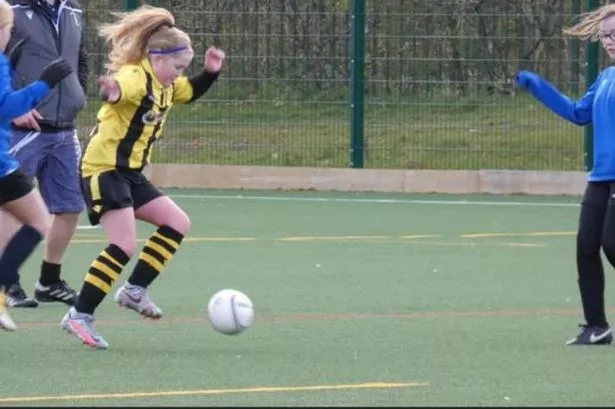A gifted young Scottish player in the world of football found herself suddenly paralysed from the waist down due to the onset of an unusual disease, losing all sensation in her legs.
What seemed like an urgent situation quickly turned into a nightmare for Ruby Herriot who was rapidly sent for an MRI where she was subsequently diagnosed with Functional Neurological Disorder (FND). This unique disorder interferes with the way the brain processes and transmits information to the body, which resulted in the unfortunate 10-year-old losing her ability to walk.
She then spent a brutal 46 days at the famous Royal Hospital for Sick Children located in Edinburgh, having to undergo gruelling and intense rehabilitation therapy twice a day to regain her ability to walk.
Her mother, Leanne, a local resident of Edinburgh, described Ruby as the ‘fittest little girl’ who was not only a great dancer but a gifted footballer for her team, Hutchison Vale. Following the diagnosis of Functional Neurological Disorder (FND), sports and dancing life came to a jarring halt. “It was terrifying at times, not knowing whether she would ever walk again. Despite the pain and mental stress, we stayed hopeful, but it was undeniably hard.
Ruby spent 46 gruelling days in the hospital, relearning how to walk. However, she still cannot feel her legs,” said Leanne with a clear sense of worry in her tone.
Today, Ruby is back on the football pitch at the age of 12, but is battling new symptoms that include seizures. Unfortunately, she continues to lack sensation in her legs.
Although acknowledging the hardship of the journey, Leanne expressed her pride in her daughter’s fighting spirit. She explained, “Ruby has shown extraordinary strength in battling this horrendous disorder. A year later, she began experiencing new symptoms – seizures, uncontrollable tremors, tics and ongoing difficulty with her legs. We’re now taking things one day at a time and work hard to maintain a positive perspective.”
Of Ruby’s time in hospital, a positive development was Ruby’s connection with the Play Team, a vital service provided by the hospital that uses play to help alleviate stress and anxiety in sick children.
According to Leanne, the Play Team was a ‘godsend’. “Audrey from the Play Team was a crucial factor during Ruby’s stay at the hospital. She often brought activities for Ruby to distract her. She would often take Ruby to the playroom in her chair to engage her in activities such as drawing and board games. It helped Ruby relax and kept her spirits high during tough times.”
The Edinburgh Children’s Hospital Charity is in urgent need of raising £5000 before the end of April to continue their crucial work.
For supporting the Power of Play appeal, you may visit their donation page here.
FND can manifest numerous symptoms that can differ greatly between individuals. Some may experience a few symptoms while others may be overwhelmed by many. Presently, treatment includes rehabilitation therapy aimed at ‘retraining the brain’.












